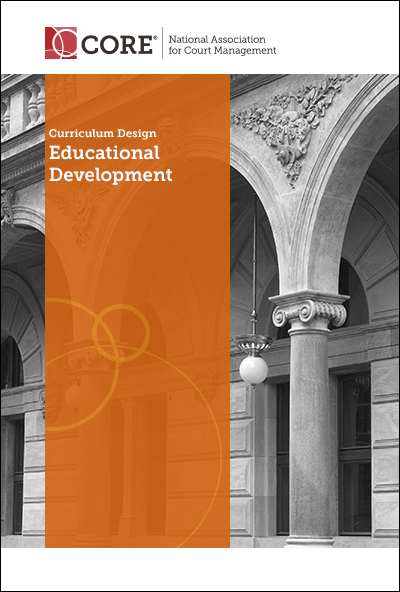Educational Development
Curriculum
Educational Development
Excellence in court performance starts with a court leader who fosters a culture that embraces education, training, and development and who actively leads judicial branch education.
Education is concerned with enhancing the intellectual capital of the courts to benefit individuals, the court as an organization, the public, and others. It involves judges and court personnel as well as court leadership (both judicial and administrative). In many courts, court managers have administrative responsibility only for education of court personnel; in others they have administrative responsibility for education of both judges and court personnel. While court managers may or may not have full responsibility for overseeing education, they need to understand why education is important, what is involved in its development and implementation, and how to determine if it is meeting expectations. As a course based on this curriculum design begins, court managers may benefit from recalling their own educational experiences in the court and why those experiences have been valuable.
A key function for the court leader is the assurance of excellent court performance by actively leading judicial branch education in their courts. Because judicial branch education helps courts maintain the balance between a continually evolving operational environment and the enduring principles and predictable processes of the court, it cannot be remedial and limited to training alone. Rather, educational development must be strategic and involve education, training, and development.
The effective court leader ensures that education, training, and development are recognized as essential and works to build a culture within the court to support it. This means excellence in programming; demonstrable results, both inside and outside the courts; and reliable and consistent funding.
The following learning objectives are designed for a comprehensive course on educational management.
As a result of this education, court leaders and managers will be able to:
-
- Describe the reasons education is relevant;
-
- Compare and contrast approaches for evaluating education;
-
- Apply the terms education, training, and development to educational needs;
-
- Select the adult education principles least addressed in educational experiences;
-
- Use instructional design tools to begin the process of developing a needed educational experience in their court;
-
- Demonstrate decision-making ability regarding education as a tool for growth;
-
- Evaluate available sources of support for education in the local court;
-
- Assess the status of education in the local court; and
-
- Develop personal strategies to actively lead education in the local court.

